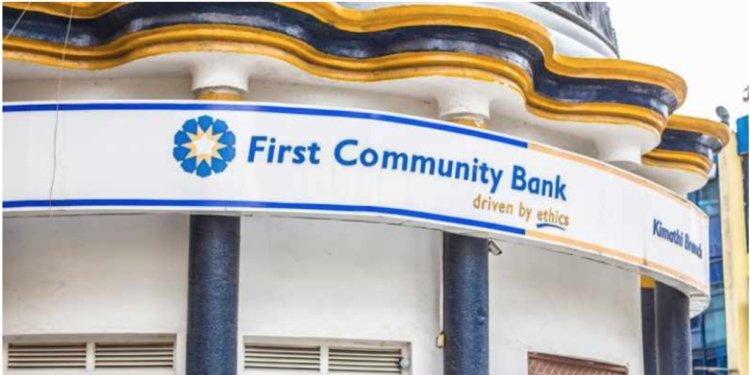First Community Bank has responded to the cash withdrawal crisis experienced on Tuesday, October 4, 2022, at the Wabera Street branch in Nairobi, leaving customers in a state of panic.
The bank’s woes came to light after it disclosed that system outages were causing delays in most of its services since last week. This led to panic withdrawals, fueling worries that a bank run was looming.
A bank run occurs when several depositors simultaneously withdraw large sums of money from banks out of concern that the institution will go bankrupt.
Read: KCB Named The Best Bank In Sustainable Finance
Customers were not permitted to withdraw more than Ksh10,000 per day from the branch, and no cheques were cleared. Responding to the recent event, the bank stated that they were experiencing a system hitch that strained operations and that they received approvals from The Central Bank Of Kenya (CBK) to limit withdrawals as a precautionary measure.
“We acknowledge that our customers may currently be experiencing challenges in some of their transactions occasioned by panic withdrawals informed by malicious rumours,” the bank said.
Read: Sidian, Victoria Commercial Banks Receive Ksh3.36 Billion For SME Lending
“These unprecedented withdrawals have caused a strain on our daily operations, necessitating the Bank under the guidance of the regulator to limit some services. We are working very closely with all our stakeholders to ensure that we continue to offer good and reliable Shari’ah-compliant banking services to Kenyans.”
As of June of this year, the bank, which has a 0.38 percent market share and is ranked 27th out of Kenya’s 39 banks, has Ksh22.2 billion in deposits. The bank’s core capital at the end of 2021 was Ksh1.1 billion, which was slightly over the Ksh1 billion recommended lower limit contrary to the previous two years, where the bank had missed the mark in both 2020 and 2019.
CBK in the recent past mediated agreements to prevent the collapse of banks, such as the sale of Spire Bank’s assets to Equity Bank.
Dubai Bank was placed under receivership in August 2015, followed by Imperial Bank in October of the same year. On April 7, 2016, Chase Bank was also placed under receivership after experiencing financial troubles that left its depositors and creditors scrambling.
Former Chase Bank boss Zafrullah Khan one of the 29 shareholders at FCB owns a 2.7% stake with 135,059 shares making him the sixth biggest shareholder.
Opportunity Logistics Services Ltd owns 811,000 shares, which equates to 16.5 per cent, the largest shareholder being a firm owned by businessman Hussein Ali Salad. Ameir Munif Abdallah Nadhi and Said Edha Abdallah Nadhi each have 805,000 shares, making them the joint second biggest shareholders.
The former Chase Bank CEO is accused of defrauding the firm of more than Ksh1.6 billion through fraudulent lending and bonus schemes. In an effort to recover Ksh14 billion, the Kenya Deposit Insurance Corporation (KDIC) has also filed a civil lawsuit against Mr Khan and a number of other former Chase Bank executives.
While Zafrullah Khan invested millions of dollars in the banking industry due to his passion for the field, he faced a lot of adversities. FCB shares remain the only profitable investment Mr Khan has left in the industry, as per public record.
Email your news TIPS to editor@thesharpdaily.com















